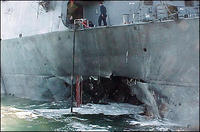-
Collaborators sought for emergency communications network demo
NIST and NTIA are seeking partners in the telecommunications industry to help create a demonstration broadband communications network for the U.S. emergency services agencies; the demonstration network will provide a common site for manufacturers, carriers, and public safety agencies to test and evaluate advanced broadband communications equipment and software tailored specifically to the needs of emergency first responders
-
-
Uniform bomb suits standard being developed
Several federal agencies are now working with first responders to create the first nationwide standard for minimum bomb suit performance requirements; having a standard will give some assurance of quality to DHS and other agencies that award grants to bomb squads for equipment purchases; if the standard is adopted, DHS will change its grants process to ensure awards are spent on bomb suits that meet the requirements
-
-
DARPA seeks self-aiming, one-shot sniper rifle
Lockheed Martin awarded $6.9 million to develop a sniper rifle to operate over a range of visibilities, atmospheric turbulence, scintillation, and environmental conditions; the company’s objective is to deliver fifteen field-testable and hardened prototype systems by October 2011
-
-
Satellite images show Hezbollah training in Syria missile base
Syria’s Assad has been presenting himself to Europe and the United States as a peace-seeker, but he continues to maintain his strategic alliance with Iran and Hezbollah; Google Earth photos show Scuds at base near Damascus, and also show Hezbollah militants being trained in maintaining and firing the missiles
-
-
Initial tests for buried victims rescue device completed
New victim detection device has been developed as part of a project aiming to enable people to be found quickly from under collapsed buildings or from natural elements like mud or snow; the detection device could literally be a lifeline for victims of future earthquakes, landslides, or terrorist attacks
-
-
Inverted prisms make ray guns practical
Lasers can be powerful weapons — they can take down an aircraft at long ranges and in unstable conditions, for instance; they are hampered, though, by power and size limits, so they are not yet widely used by the military; Lockheed Martin says it has a solution
-
-
Cole's legacy: a different U.S. Navy

The terrorist bomb attack on the destroyer Cole on 12 October 2000 was a watershed moment in modern Navy history; it was also a wake-up call on the need for better force protection, damage-control training, intelligence sharing, shipboard equipment, and mass-casualty response
-
-
Russia's inflatable military
Russia is building inflatable weapons which, to an enemy radar or satellite imagery, appear like real weapons; they are easy to transport and quick to deploy — and they cost far less to produce then real weapons
-
-
USAF develops UAVs that fly themselves
A U.S. Air Force project will allow UAVs to fly themselves — in multiple-aircraft formations — without colliding; the USAF is working to develop systems that unmanned aircraft can use to sense the presence of other aircraft and take action to prevent collisions that are safe enough so that UAVs can perform any Air Force mission
-
-
Giant blimps to ferry hospitals, buildings to disaster zones

Giant airship will be able to lift up to 150 tons — more than seven times the weight that helicopters are able to carry; the airship, which will be able to move aid — or even portable hospitals and entire buildings — to remote areas or disaster zones, harnesses aerostatic lift, meaning it is able to fly using lighter-than-air (LTA) gases that keep it buoyant rather than aerodynamic lift
-
-
Skullduggery on a massive scale
Stuxnet, the malware which attacked more than 30,000 computers used in industrial control systems in Iran, including that country’s nuclear weapons facilities, represents a new class and dimension of malware; it can reach into the physical world, allowing attackers to run motors so fast they burn out, to turn off alarms and safety cut-offs, open effluent valves and activate pumps — in the words of Paul Marks, it allows attackers to “carry out industrial sabotage and skullduggery on a massive scale”
-
-
Food delivery services boom as violence force people to stay home
More than 4,000 jobs have disappeared in the restaurant industry and about 40 percent of dining establishments have closed due to the high levels of crime in the border city; as one industry declines, another emerges: more and more companies are now offering home deliveries of food from different restaurants to Juarez residents who fear going out
-
-
Rocket-propelled life preserver saves victims from drowning
A new rescue device ingeniously buys more time for a rescuer to ready a response and reach a drowning victim; borrowing the design of a rocket-propelled grenade, the new rescue system fires an expanding foam bullet up to 500 feet; once the bullet hits the water, it expands forty-times its original size into a life preserver; because the bullet is made of foam, even if it strikes the victim, it would do as much damage as a tennis ball
-
-
Sector Report for Tuesday, 5 October 2010: Emergency / Police / Mil.
This report contains the following stories.
Plus 1 additional story.
-
-
Number of extremist, hard-to-police Web sites skyrockets
The number of extremist Web sites has skyrocketed, expanding from 12 in 1998 to 4,500 in 2006; Western authorities say that taking action to remove them remains difficult; different countries have adopted different approaches to the problem
-
More headlines
The long view
Why Ukraine’s AI Drones Aren’t a Breakthrough Yet
Machine vision, a form of AI, allows drones to identify and strike targets autonomously. The drones can’t be jammed, and they don’t need continuous monitoring by operators. Despite early hopes, the technology has not yet become a game-changing feature of Ukraine’s battlefield drones. But its time will come.
